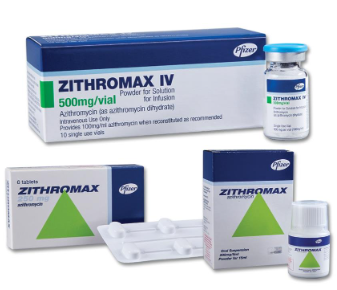Azithromycin is a type of antibiotic that is commonly used to treat various bacterial infections. This medication belongs to the class of macrolide antibiotics, which work by stopping the growth of bacteria.
Here are some of the diseases that azithromycin can treat:
It's important to note that azithromycin should only be used to treat bacterial infections and not viral infections such as the common cold or flu. Additionally, as with all antibiotics, overuse of azithromycin can lead to antibiotic resistance, so it's important to only use it when prescribed by a healthcare professional and to follow the instructions carefully.
The main feature of azithromycin 250mg
Azithromycin 250mg is a dosage of the antibiotic medication azithromycin z pack. The main feature of azithromycin 250mg is its ability to treat a variety of bacterial infections.
Azithromycin is a broad-spectrum antibiotic that is effective against many types of bacteria. It works by preventing the bacteria from growing and multiplying, which helps to clear the infection. Azithromycin 250mg is commonly used to treat respiratory tract infections, such as pneumonia and bronchitis, as well as skin and soft tissue infections, ear infections, and some sexually transmitted infections.
One of the main benefits of azithromycin 250mg is that it is taken once a day for a short period of time, usually 3-5 days, depending on the condition being treated. This makes it a convenient treatment option for people who have busy schedules or who find it difficult to remember to take medication multiple times a day.
Azithromycin 250mg is generally well-tolerated, but as with all medications, it can cause side effects. Common side effects include nausea, diarrhea, and abdominal pain. It is important to talk to a healthcare provider if you experience any side effects while taking azithromycin 250mg or if you have any concerns about its use.
Antibiotics for Respiratory tract infections
Antibiotics are not always necessary for respiratory tract infections (RTIs), as many of these infections are caused by viruses rather than bacteria. However, if the infection is bacterial in nature, antibiotics may be prescribed. Here are some examples of antibiotics that may be used to treat RTIs:
Amoxicillin: This is a commonly prescribed antibiotic for respiratory infections, such as acute otitis media, streptococcal pharyngitis, and acute bacterial sinusitis.
Azithromycin: This is a macrolide antibiotic that can be used to treat community-acquired pneumonia, acute bacterial sinusitis, and acute exacerbations of chronic obstructive pulmonary disease (COPD).
Doxycycline: This is a tetracycline antibiotic that can be used to treat respiratory infections, such as community-acquired pneumonia, bronchitis, and sinusitis.
Ceftriaxone: This is a third-generation cephalosporin antibiotic that can be used to treat severe respiratory infections, such as community-acquired pneumonia and meningitis.
It's important to note that the appropriate antibiotic and dosage will depend on the type and severity of the infection, as well as the patient's medical history and any allergies they may have. It's also important to take antibiotics as directed by your healthcare provider and to finish the entire course of treatment, even if you start feeling better before the medication is finished.
What antibiotics can be bought without a prescription?
It is not safe or legal to buy antibiotics without a prescription from a licensed healthcare provider. Antibiotics are prescription medications because they can cause serious side effects if not used properly, and their use should be monitored by a healthcare provider. Taking antibiotics without a proper diagnosis and prescription can also contribute to antibiotic resistance, which is a growing global health threat.
There may be some over-the-counter medications marketed as "natural antibiotics," but they do not contain actual antibiotics and have not been shown to effectively treat bacterial infections. It is important to see a healthcare provider if you have symptoms of a bacterial infection and to follow their prescribed treatment plan.
Myths and truth about antibiotics and alcohol
There are many myths and misconceptions about the interaction between antibiotics and alcohol. Here are some common myths and the truth about antibiotics and alcohol:
Myth 1: You can't drink alcohol while taking antibiotics.
Truth: While it is generally recommended to avoid alcohol while taking antibiotics, not all antibiotics have a significant interaction with alcohol. However, some antibiotics can cause side effects such as nausea, vomiting, dizziness, and stomach upset, which can be worsened by alcohol consumption. Additionally, alcohol can interfere with the body's ability to fight off infection, so it's best to avoid drinking alcohol while you're sick.
Myth 2: Drinking alcohol while taking antibiotics can make the antibiotics less effective.
Truth: There is no evidence to suggest that drinking alcohol will make antibiotics less effective. However, heavy alcohol consumption can weaken the immune system and make it harder for the body to fight off infection, which can affect how quickly you recover.
Myth 3: Mixing alcohol and antibiotics can cause serious health problems.
Truth: While there are some antibiotics that can have serious interactions with alcohol, such as metronidazole and tinidazole, these interactions are not common with most other antibiotics. However, mixing alcohol with antibiotics can cause increased side effects such as nausea, vomiting, and dizziness, so it is generally recommended to avoid drinking alcohol while taking antibiotics.
It's important to always follow your healthcare provider's instructions when taking antibiotics and to ask them if it is safe to consume alcohol while on antibiotics. It's also important to avoid excessive alcohol consumption, especially when you're sick and your immune system is already compromised.
Copyright © 2022-2023 Scientific Materials.
